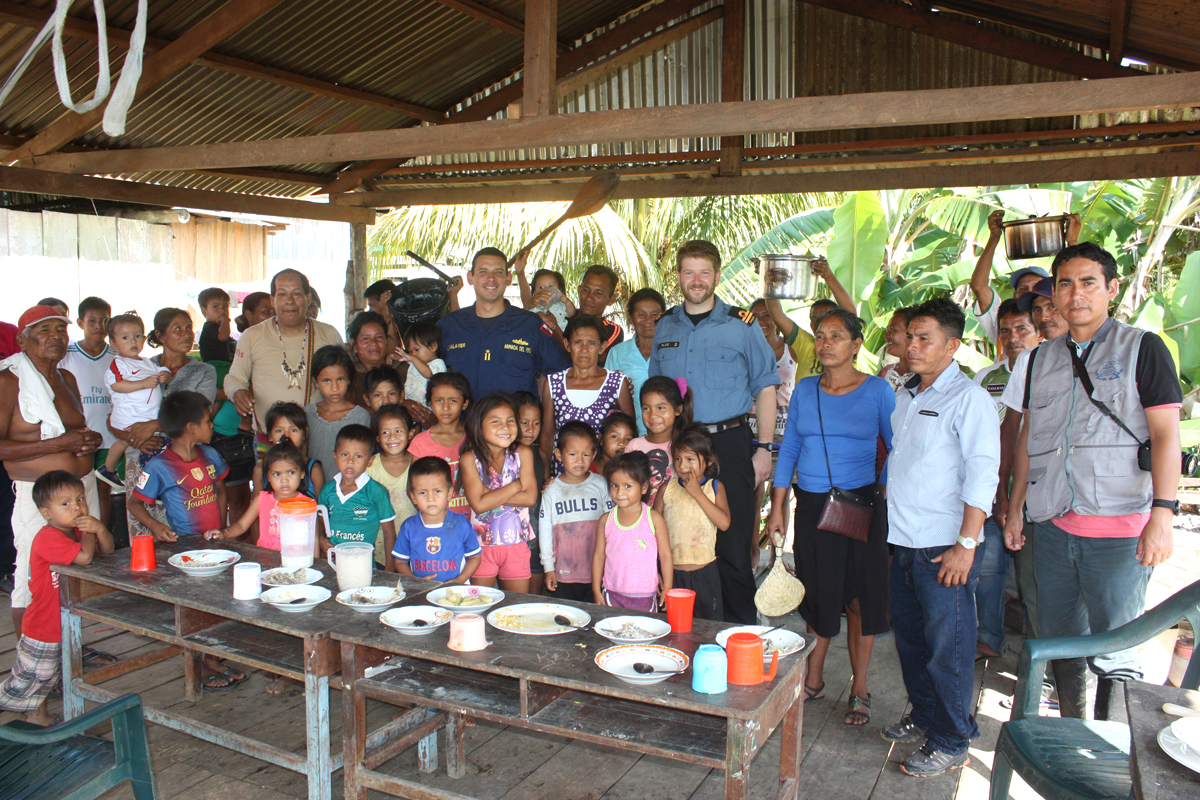RCN sailor visits Amazon
By Lookout on Oct 29, 2019 with Comments 0

In Santa Isabel de Pichana, Lt(N) Place, the CO, and others were treated to a fine meal of fish, fruit, cassava and plantains by the cacique and his family.
Lt(N) Sean Place ~
Late this summer, I had the privilege of being embarked in BAP Río Putumayo II, an Itinerant Social Action Platform (PIAS in Spanish) vessel of the Peruvian Navy or Marina de Guerra del Perú in Spanish. Río Putumayo II and her five sister ships, with seven more planned, provide an invaluable and unique service by bringing a great number of government facilities to small, remote communities in the Peruvian Amazon and Lake Titicaca.
The PIAS-class has been in Peruvian Navy service since 2015, and are mostly based in Iquitos, a city of 300,000 which is only accessible by river and air. The base in Iquitos provides convenient access to the Amazon, Putumayo, Napo, Tigre, Marañon, Yavarí, and Ucayali rivers which form the circulatory system of the Loreto region of Northern Peru, which borders Colombia, Brazil, and Ecuador.
Each PIAS typically completes five 40-day deployments annually, with work periods of varying lengths between deployments. If that seems like a high operational tempo, it is. However, the crews often serve for only one year, and receive a financial bonus for service in the PIAS-class.
A typical community visited by a PIAS is five or six houses made of cedar planks with a roof of woven dried leaves, unglazed windows, no running water or flush toilet, a kitchen hearth, and one or two light bulbs hanging from the ceiling; a one-room schoolhouse with recycled textbooks and no modern technology; people fishing or hunting every day because there is no refrigeration to keep food from spoiling; and communication with the outside world only by expensive satellite phone, or sailing in open canoes to larger towns.
Travelling to larger communities to sell timber, fish, or game, the main legal industries, is expensive, time-consuming, and often impractical due to lack of refrigeration. Many people are lured into the cocaine industry either by promises of easy money, threats, or a combination of both.
In communities such as this, there is no access to medical care, pensions, services to assist with family or sexual violence, social insurance, or any ability for the government to assess the quality of the schools.
That is where the PIAS come in and provides services with the help of approximately 20 civilians embarked. There is an ATM to withdraw cash and a tiny bank branch to assist people in opening accounts, managing savings, and transferring money; small classrooms filled with children’s books and educational materials; a dentist; a doctor’s office with a laboratory and small surgery; a vaccination clinic; an obstetrician; a pharmacy; and offices for the national pension, identification, and social insurance systems.
Additionally, representatives of the Ministry of Culture are embarked to ensure due regard is paid to the Kichwa and Murui Muinan+ indigenous cultures of these isolated communities. The PIAS program, which is a collaborative effort of seven government ministries, certainly cannot fix all the problems of the Peruvian Amazon, but it does measurably improve people’s lives.
During my time in Río Putumayo II, I visited 22 different communities on the Putumayo or Amazon rivers for one or two days each, where I accompanied the CO in meetings with the cacique, or village leader, to discuss the individual problems faced by their village. We frequently ate, played sports, and participated in cultural activities with the people of the communities, in order to build trust and good working relationships.
I also spent time working with many of the civilian crew members in their duties, such as by assisting in lessons to children about family violence. Many people were very interested in me because I was the first foreigner to visit their community, and I was treated with great hospitality to succulent Amazonian meals such as crocodile, piranha, and wild pig.
During my six week Operation Regulus exchange in the Peruvian Navy, I learned a great deal about riverine navigation but even more about the realities of life in a remote part of the world. I was extraordinarily fortunate to witness the natural wonders of the Amazon and Putumayo Rivers, as well as the commendable work of the PIAS program, and it was an experience I will never forget.
Filed Under: Top Stories
About the Author:





